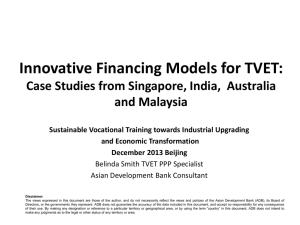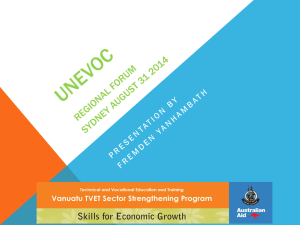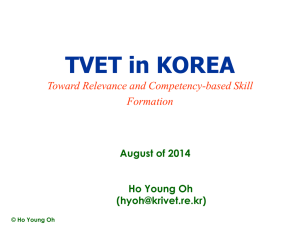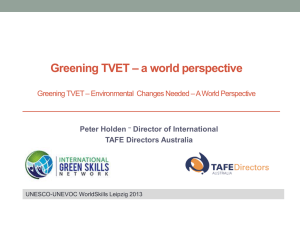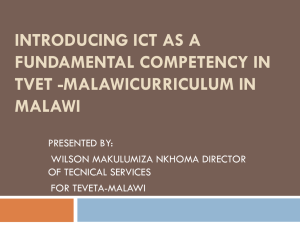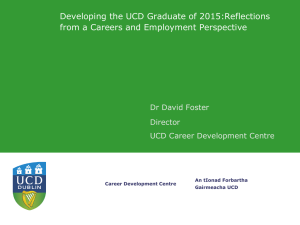- rksi.org
advertisement
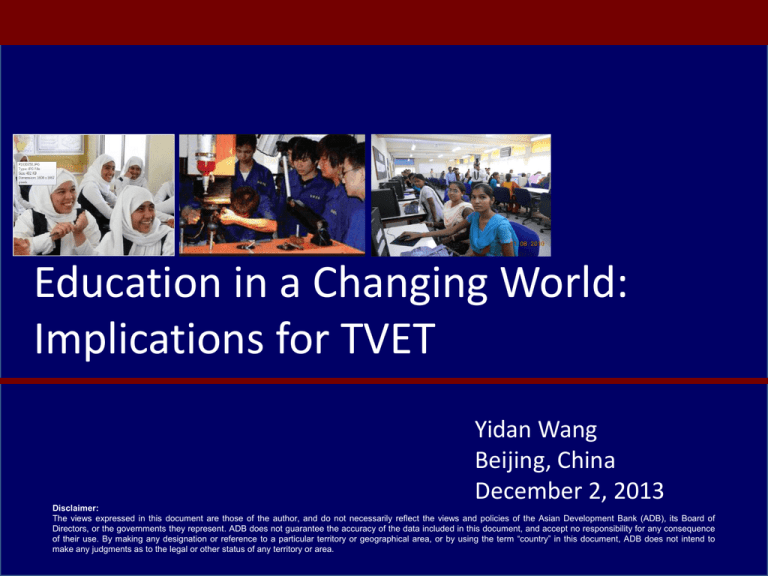
Education in a Changing World: Implications for TVET Yidan Wang Beijing, China December 2, 2013 Disclaimer: The views expressed in this document are those of the author, and do not necessarily reflect the views and policies of the Asian Development Bank (ADB), its Board of Directors, or the governments they represent. ADB does not guarantee the accuracy of the data included in this document, and accept no responsibility for any consequence of their use. By making any designation or reference to a particular territory or geographical area, or by using the term “country” in this document, ADB does not intend to make any judgments as to the legal or other status of any territory or area. Education in a Changing World: Implications for TVET Outline I. Understanding the changing context II. Flexibility III. Skills IV. Employability V. Conclusions 2 Yidan Wang Education in a Changing World: Implications for TVET lexibility, Skills and Employability I. Understanding the changing context Technological changes Migration Demographic trends Labor market structure Workplace composition Implications on Education 3 Yidan Wang Education in a Changing World: Implications for TVET lexibility, Skills and Employability I. Understanding the changing context Technological changes - Computers have replaced many human tasks - Technologies have shortened production cycle and increased productivity - Increased demand for high skilled workforce 4 Yidan Wang Education in a Changing World: Implications for TVET I. Understanding the changing context Demands for skilled and unskilled workforce in employment 5 Yidan Wang Education in a Changing World: Implications for TVET I. Understanding the changing context Trends in migration: •International migration (210 million): skilled workers •Domestic migration (740 million): unskilled worker Migrants’ skills training Education of their children 6 Yidan Wang Education in a Changing World: Implications for TVET I. Understanding the changing context Demographic trends Working-Age Population by Region, 2010–2050 Regions 2010 (billions) 2050 (billion) Increase/decrease (%) North America 0.23 0.27 +16 % Latin America and the Caribbean Europe 0.39 0.49 +26% 0.50 0.38 -23% Africa 0.58 1.3 +125% Asia 2.80 3.40 +22% Oceania 0.02 0.03 +31% Source: UNDP 2009. Yidan Wang Education in a Changing World: Implications for TVET I. Understanding the changing context Labor market structure and employment – Less people work in agriculture – More people work in service sectors Language skills, management, inter-personal relations, problem solving and decision-making 8 Yidan Wang Education in a Changing World: Implications for TVET I. Understanding the changing context World and Regional Estimates of Employment by Sector Both Sexes WORLD Developed Economies and European Union Central &South-Eastern Europe (NonEU) &CIS East Asia South-East Asia and the Pacific South Asia Latin America &the Caribbean North Africa Sub-Saharan Africa Middle-East Employment in agriculture (%) 1996 2006 41.9 36.1 6.2 4.2 Employment in industry (%) 1996 2006 21.1 21.9 28.5 24.7 Employment in services (%) 1996 2006 37.0 42.0 65.3 71.2 27.2 20.3 28.7 25.8 44.1 53.8 48.5 51.0 59.7 23.1 36.5 74.4 21.1 40.9 45.4 49.4 19.6 34.4 65.9 18.1 24.3 16.5 15.2 20.7 19.8 7.5 25.2 25.6 18.6 21,0 20.8 20.0 10.0 25.6 27.2 32.5 25.1 56.1 43.7 18.1 53.7 33.5 36 29.6 59.6 45.6 24.1 56.3 9 Yidan Wang Education in a Changing World: Implications for TVET I. Understanding the changing context Workplace composition Change from 10% leads and 90% follows in industrial society Less hierarchy and multiple tasks 10 Yidan Wang Education in a Changing World: Implications for TVET I. Understanding the changing context Workplace composition: -More people work in SMEs -People change jobs frequently: – In the US, people change jobs 10.5 times between ages of 18 and 40 – The young generation changes jobs more often than their parents Skills updates and multiple degrees/certificates 11 Yidan Wang Education in a Changing World: Implications for TVET I. Understanding the changing context Implications for TVET - A flexible system to respond to the learning needs for all - New skills and soft skills to enable people to get employed and to contribute to the society - Multiple roles to increase employability 12 Yidan Wang Education Education in ainChanging a Changing World: World: Flexibility, Flexibility, Skills Skills andand Employability Employability Education in a Changing World: Implications for TVET II. Flexibility Tripartite Learning Framework Flexibility Learners/ Workers Skills Employability 13 Yidan Wang Education in a Changing World: Implications for TVET Education in a Changing World: Flexibility, Skills and Employability II. Flexibility A good education system should provide people with • what they need to learn • when they want to learn • how they want to learn 14 Yidan Wang Education in a Changing World: Implications for TVET II. Flexibility Questions to ask: - Is the structure flexible enough to allow all who need skills to have the opportunity to learn? - Is the duration of study appropriate to meet everybody’s needs? - Is the time convenient for learners? - Is it only one chance or 2nd and multiple chances? 15 Yidan Wang Education in a Changing World: Implications for TVET III. Skills Tripartite Learning Framework Flexibility Learners/ Workers Skills Employability 16 Yidan Wang Education in a Changing World: Implications for TVET III. Skills Education is supposed to deliver the competencies and skills that enable people to participate in society and live successful lives. But the competencies and skills in demand change over time… 17 Yidan Wang Education in a Changing World: Implications for TVET III. Skills • Emerging important competencies and skills - ICT skills - Languages - Science, mathematics, and engineering - Higher-order skills – expert thinking and complex communication - Soft skills 18 Yidan Wang Education in a Changing World: Implications for TVET III. Skills Manpower Global Talent Shortage Survey 1. Sales Representatives. 2. Skilled Manual Trades. 3. Technicians. 4. Engineers. 5. Accounting and Finance Staff. 6. Laborers. 7. Production Operators. 8. Drivers. 9. Management/Executives. 10. Machinists/Machine Operators. 41 % of employers worldwide are having difficulty filling positions due to the lack of suitable talent available Total Number of Respondents: 36,629 Employers indicating difficulty filling positions: 41% Employers indicating no difficulty filling positions: 59% Margin of error: +/- 3.9% Source: Manpower: Driving Sustainable growth through labor market strategy 19 Yidan Wang Education in a Changing World: Implications for TVET III. Skills Issues: Demand and supply gaps for skills 20 Source: Manpower 2010 Yidan Wang Education in a Changing World: Implications for TVET III. Skills Employer surveys point to persisting skills shortages 21 Yidan Wang Education in a Changing World: Implications for TVET III. Skills Questions to ask: – Do the skills taught at TVET schools meet the needs of labor markets? – Do the employers get involved in designing and teaching the skills? – Do TVET schools get feedback from employers about their graduates? – Do “Soft skills” included in the curriculum? 22 Yidan Wang Education in a Changing World: Implications for TVET IV. Employability Tripartite Learning Framework Flexibility Learners/ Workers Skills Employability 23 Yidan Wang Education in a Changing World: Implications for TVET IV. Employability Young people may pursue secondary, tertiary or higher education, but education itself is not an ultimate goal. Good education should enable people to participate in the world and society effectively. 24 Yidan Wang Education in a Changing World: Implications for TVET IV. Employability Issues and challenges: - School-to-work transition was very much a state responsibility, but not anymore - Education attainment ≠ employment - Germany’s dual system model is facing challenge 25 Yidan Wang Education in a Changing World: Implications for TVET IV. Employability Questions to ask: - Is there an incentive/support from the government to provide training to unemployed and firms to provide internships and jobs? - Does school have a career guidance program? - Do learners seek out their own learning opportunities and experiences? - Is there a public career information system? 26 Yidan Wang Education in a Changing World: Implications for TVET V. Conclusions Flexibility: • Making the system flexible • Targeting the unemployed Skills • Focusing on new skills and soft skills Employability • Emphasizing on multiple roles, career information and guidance 27 Yidan Wang Education in a Changing World: Implications for TVET Thank You ywang3@worldbank.org Yidan Wang

